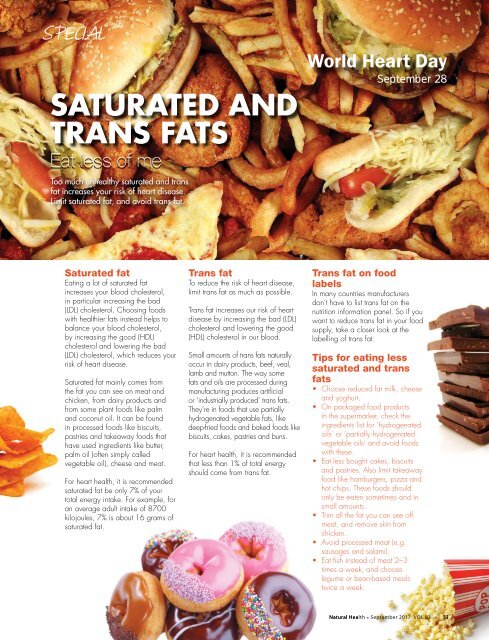Natural Health September 2017
You also want an ePaper? Increase the reach of your titles
YUMPU automatically turns print PDFs into web optimized ePapers that Google loves.
SPECIAL<br />
Saturated and<br />
trans fats<br />
Eat less of me<br />
Too much unhealthy saturated and trans<br />
fat increases your risk of heart disease.<br />
Limit saturated fat, and avoid trans fat.<br />
World Heart Day<br />
<strong>September</strong> 28<br />
Saturated fat<br />
Eating a lot of saturated fat<br />
increases your blood cholesterol,<br />
in particular increasing the bad<br />
(LDL) cholesterol. Choosing foods<br />
with healthier fats instead helps to<br />
balance your blood cholesterol,<br />
by increasing the good (HDL)<br />
cholesterol and lowering the bad<br />
(LDL) cholesterol, which reduces your<br />
risk of heart disease.<br />
Saturated fat mainly comes from<br />
the fat you can see on meat and<br />
chicken, from dairy products and<br />
from some plant foods like palm<br />
and coconut oil. It can be found<br />
in processed foods like biscuits,<br />
pastries and takeaway foods that<br />
have used ingredients like butter,<br />
palm oil (often simply called<br />
vegetable oil), cheese and meat.<br />
For heart health, it is recommended<br />
saturated fat be only 7% of your<br />
total energy intake. For example, for<br />
an average adult intake of 8700<br />
kilojoules, 7% is about 16 grams of<br />
saturated fat.<br />
Trans fat<br />
To reduce the risk of heart disease,<br />
limit trans fat as much as possible.<br />
Trans fat increases our risk of heart<br />
disease by increasing the bad (LDL)<br />
cholesterol and lowering the good<br />
(HDL) cholesterol in our blood.<br />
Small amounts of trans fats naturally<br />
occur in dairy products, beef, veal,<br />
lamb and mutton. The way some<br />
fats and oils are processed during<br />
manufacturing produces artificial<br />
or ‘industrially produced’ trans fats.<br />
They’re in foods that use partially<br />
hydrogenated vegetable fats, like<br />
deep-fried foods and baked foods like<br />
biscuits, cakes, pastries and buns.<br />
For heart health, it is recommended<br />
that less than 1% of total energy<br />
should come from trans fat.<br />
Trans fat on food<br />
labels<br />
In many countries manufacturers<br />
don’t have to list trans fat on the<br />
nutrition information panel. So if you<br />
want to reduce trans fat in your food<br />
supply, take a closer look at the<br />
labelling of trans fat.<br />
Tips for eating less<br />
saturated and trans<br />
fats<br />
• Choose reduced fat milk, cheese<br />
and yoghurt.<br />
• On packaged food products<br />
in the supermarket, check the<br />
ingredients list for ‘hydrogenated<br />
oils’ or ‘partially hydrogenated<br />
vegetable oils’ and avoid foods<br />
with these.<br />
• Eat less bought cakes, biscuits<br />
and pastries. Also limit takeaway<br />
food like hamburgers, pizza and<br />
hot chips. These foods should<br />
only be eaten sometimes and in<br />
small amounts.<br />
• Trim all the fat you can see off<br />
meat, and remove skin from<br />
chicken.<br />
• Avoid processed meat (e.g.<br />
sausages and salami).<br />
• Eat fish instead of meat 2–3<br />
times a week, and choose<br />
legume or bean-based meals<br />
twice a week.<br />
<strong>Natural</strong> <strong>Health</strong> * <strong>September</strong> <strong>2017</strong> VOL 83<br />
31

















